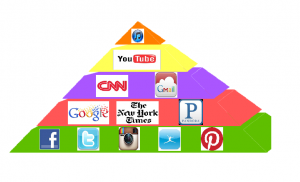Clay Shirky, an American writer, consultant and teacher on the social and economic effects of Internet technologies once said “There is no such thing as information overload, only filter failure.”
Throughout chapter nine of Mark Briggs book, “Journalsim Next,” he delves into methods that can be used to digitize your life, and eventually concludes with ways to digitize your journalism.
With an abundance of information jam-packed into a mere thirty-some pages, I found that some of the material resonated more than others; David Allen and cloud sourcing for example.
David Allen is the mastermind behind the hit book “Getting Things Done.” His core principles were to identify, capture and organize information. Although he didn’t use the concepts in adherence with the internet, folks quickly realized the full potential of his methods when paired with digital technology. By using technology as a means to identify, capture and organize information, consumers are aided in streamlining their personal and professional lives. This concept put in action can be seen in sites like Evernote and Google Docs; which ultimately allow consumers to execute a number of tasks within one browsing tab. What’s fantastic about sites like Evernote and Google Docs is that they are equipped with cloud computing. In other words, these sites make it possible to access your information in any situation where an internet connection is available–some site even have functions to allow access to documents sans wifi.
As a college student who receives around 50 emails a day, I was especially drawn to Briggs section on organizing your inbox. He went into depth about one of Allen’s key components to getting things done–“Inbox Zero”– and that is to spend no more than two minutes per email and to have an empty inbox once you complete an email session. Although I am proud to be able to resonate with his ideas on organization through creating new folders within your email system, I find it very difficult to maintain organization with responding to emails unless I keep the most important messages in my inbox so that I am able to mark them as unread and see them regularly when I sign in. Therefore, when it comes to emails–and honestly probably a lot of things in life–it’s really a personal preference when it comes down to the details of getting everything done.
Lastly, I especially liked the Newsroom Innovator on Ryan Pitts, the Senior Editor for Digital News. He pointed out that his favorite part of digital journalism is that he gets to build something that not only shows the big picture but is also able to connect with people on more personal levels. He went on to explain the benefits of digital journalsim and how each page invites exploration, with links to related pages.
I suppose I never truly thought of the internet as exploration–but when it comes down to it that’s what we’re all doing as we click from page to page viewing the expanse of the World Wide Web.


 Over the past few weeks George Mason Students have been bundled up from head to toe as they face the wintry weather that January has to offer in Northern Virginia. With extreme lows in the teens it has become difficult to not hit the snooze button and avoid facing what feels like Antarctica in order to trek across campus to class.
Over the past few weeks George Mason Students have been bundled up from head to toe as they face the wintry weather that January has to offer in Northern Virginia. With extreme lows in the teens it has become difficult to not hit the snooze button and avoid facing what feels like Antarctica in order to trek across campus to class.